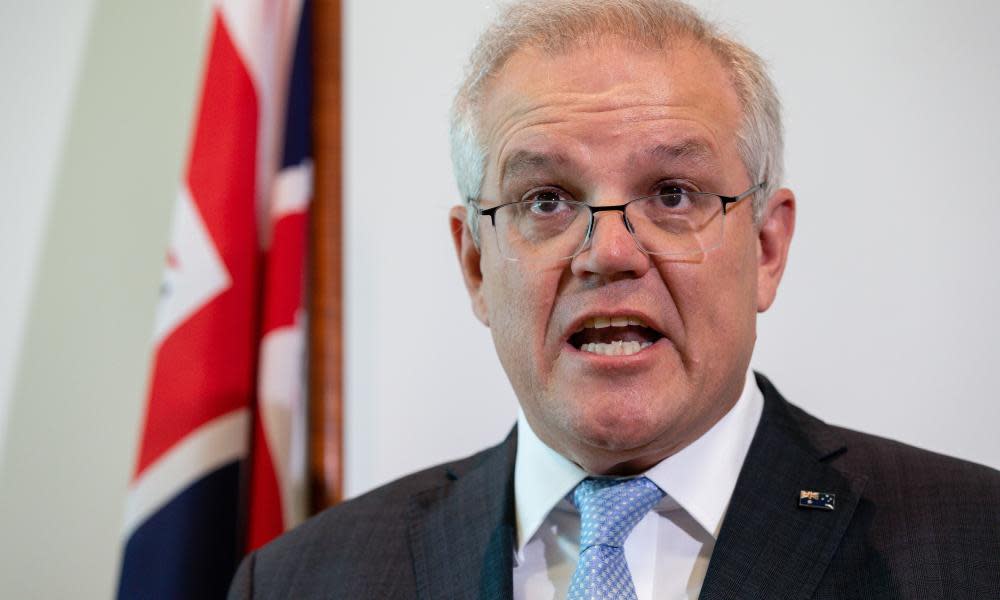World at risk of ‘great polarisation’, Scott Morrison tells Indian forum

The world is at risk of “a great polarisation” between autocracies and democracies, Scott Morrison has declared, while also appearing to take aim at China for using “economic coercion” as “a tool of statecraft”.
The Australian prime minister told an audience in India on Thursday that liberal rules and norms were “under assault”, tensions over territorial claims in the Indo-Pacific region were growing, and militaries were being modernised “at an unprecedented rate”.
Painting a bleak picture of the state of the world, Morrison said democratic nations were “being threatened and coerced by foreign interference” and cyber-attacks from state-sponsored actors were becoming more sophisticated and frequent.
Related: Thousands of Myanmar citizens in Australia at risk of being deported to violence back home
While he did not mention China by name, Morrison alluded to the series of trade actions taken by Beijing against Australian export sectors over the past year when he said: “Economic coercion is being employed as a tool of statecraft.”
In a virtual address to the Raisina Dialogue in New Delhi, Morrison argued Australia and like-minded nations including India needed to “act more consistently, more cohesively, more often, in our shared interests”, including on economic security.
Amid international pressure on Australia to take more ambitious action on the climate crisis, Morrison also said “global environmental issues” were another area in which countries needed to work together, but he did not elaborate.
While characterising the Indo-Pacific as “a dynamic and diverse region full of promise”, Morrison said decision-makers in Canberra were “not blind to the geopolitical realities”, including increasing strategic competition between the US and China.
“Liberal rules and norms are under assault,” Morrison said in a sharpening of his language about global trends. “And there is a great polarisation that our world is at risk of moving towards – a polarisation between authoritarian regimes and autocracies, and the liberal democracies that we love.”
He cast India and Australia as being among members of the democratic camp, saying the two countries shared a passion “for our democratic freedoms, our commitment to the rule of law, a free and open Indo-Pacific”.
He made those comments despite recent warnings from analysts about a backsliding in democratic conditions in India, including a deterioration of political and civil liberties.
Speaking from Western Australia, Morrison argued the Covid-19 pandemic had “accelerated and accentuated many of the strategic trends that have created this very real strain”. But the pandemic had also created momentum for like-minded countries “to work together like never before” and “inspired action to defend our collective interests”.
He cited elevation of the Quad grouping of Australia, India, the US and Japan after Joe Biden hosted the first leader-level talks last month. The grouping – viewed warily by China, which sees it as an attempt to contain its rise – had previously only held meetings among officials and foreign ministers.
Morrison said the Australian government had “looked on with admiration” as India had taken “an increasingly active role in the Indian Ocean and the wider Indo-Pacific region”. It was a sign that India was “a friend who will help build our region where all nations can prosper”.
The prime minister also welcomed the return of Australia to the Malabar naval exercises alongside India, Japan and the US late last year.
Despite warning of the risk of a “great polarisation” between autocracies and democracies, Morrison continued to affirm that Australia would push for “a free, open and prosperous Indo-Pacific underpinned by rules of law and respect for sovereignty”. He called for “a strategic balance that favours freedom”.
In an implicit message that Australia was deepening its ties with a range of countries across the region, rather than giving the Quad grouping excessive attention, Morrison said Canberra had enhanced its relationships with Indonesia, Vietnam, Singapore, Malaysia, Thailand and “our Pacific family”.
He said Australia was providing extra support to Papua New Guinea and Timor-Leste amid Covid-19 and flooding emergencies.
Related: Chinese-Australians ‘under-represented in public service’
China has argued that it did not initiate the challenges in the relationship with Australia, accusing Canberra of joining a Washington-led effort to contain it – something Morrison disputes.
Chinese diplomats have called on the Australian government to drop “the cold war mentality” and to look at China’s rise as “an opportunity not a threat, otherwise the whole trajectory will be derailed”.
China’s foreign ministry has also argued it is “interference” in its internal affairs for Australia to raise concerns about human rights abuses in Xinjiang, the crackdown on dissent in Hong Kong, and the militarisation of disputed features in the South China Sea.
Morrison announced earlier on Thursday that the final 80 Australian troops in Afghanistan would be home by September – in line with the withdrawal announced by Biden on Wednesday.
Morrison said the move was in line with last year’s defence policy update, which emphasised the need for the Australian defence force to shift focus from the Middle East to the Indo-Pacific.

 Yahoo News
Yahoo News 
